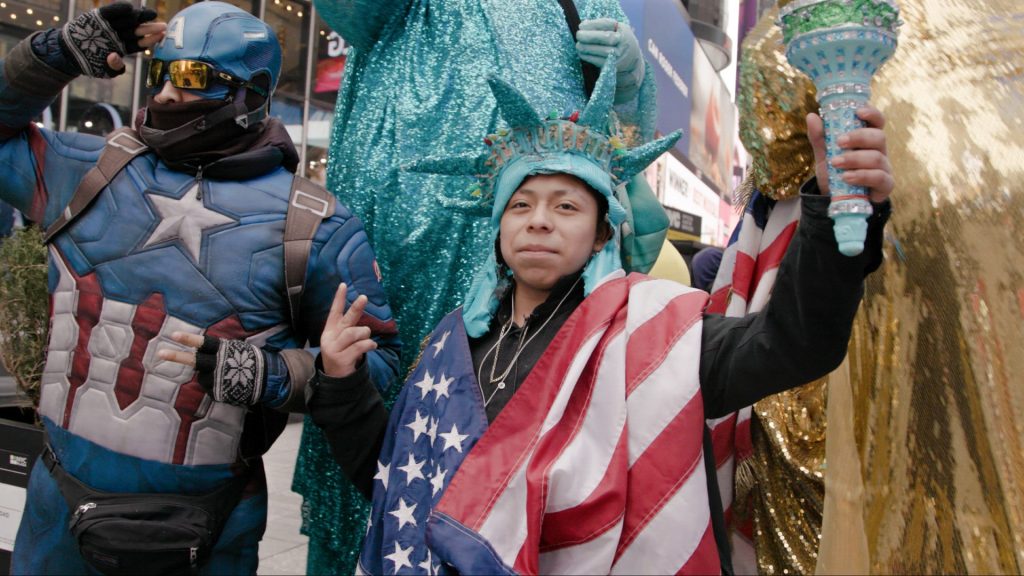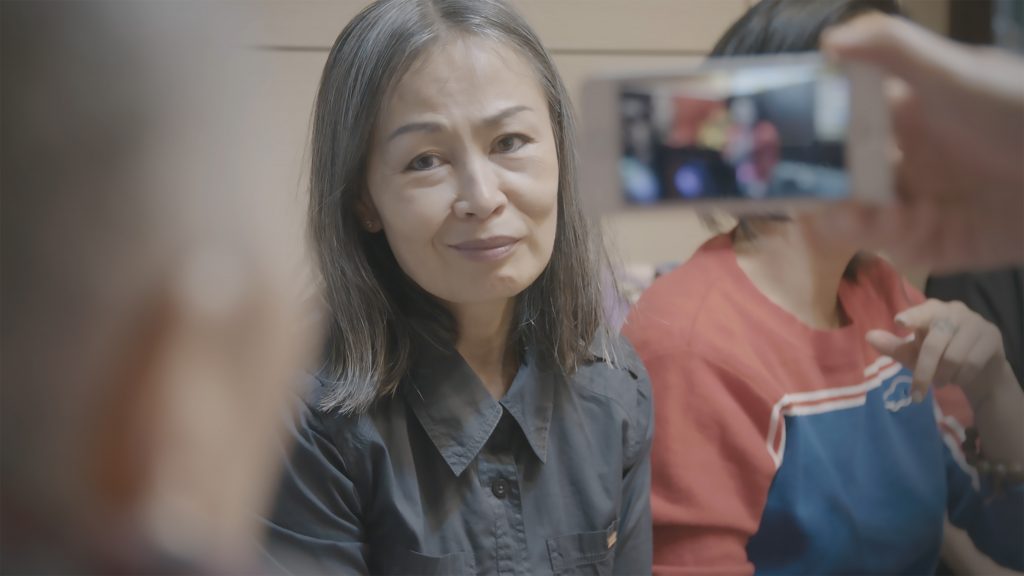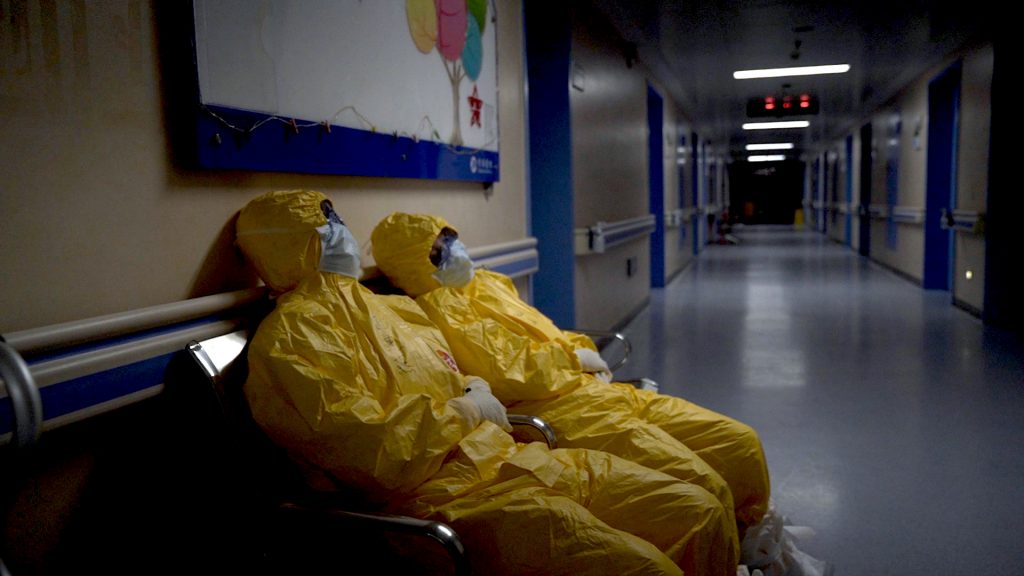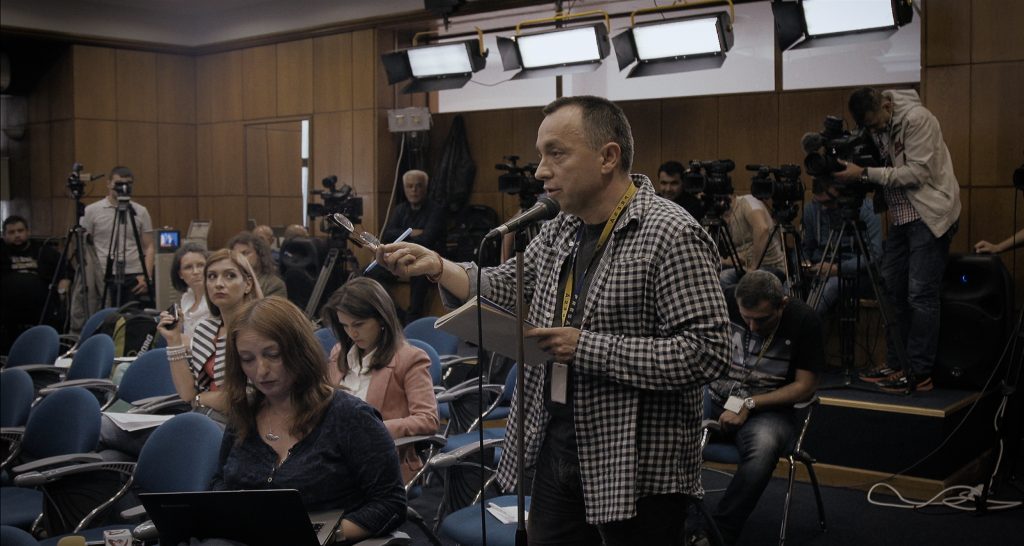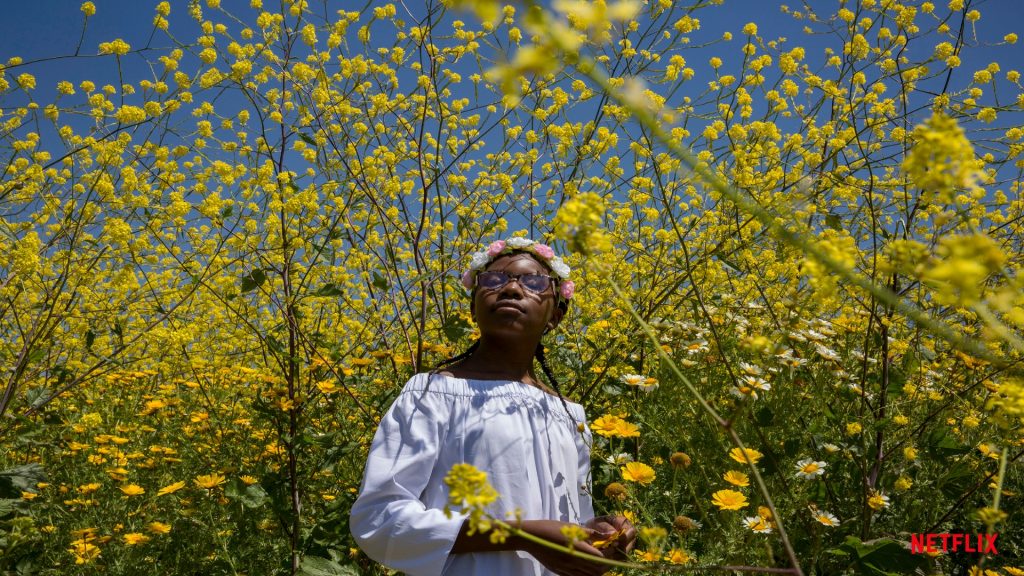December 20, 2020
by Carla Hay
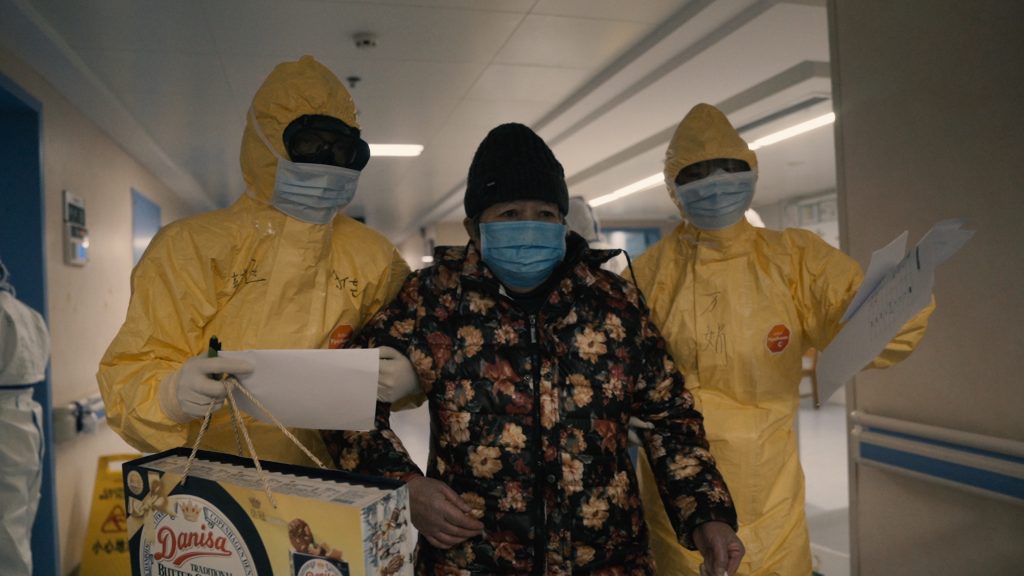
Directed by Weixi Chen, Hao Wu and Anonymous
Mandarin with subtitles
Culture Representation: Taking place in Wuhan, China, the documentary “76 Days” features an all-Asian group of medical professionals, patients and family members who were affected by the COVID-19 shutdown when the city was the epicenter of the virus.
Culture Clash: The documentary chronicles what the crisis was like for four overwhelmed hospitals, which had to turn patients away due to overcrowding and prevented people from visiting patients due to the medical dangers of spreading the virus.
Culture Audience: “76 Days” will appeal primarily to people who are interested in an inside look at how Chinese medical facilities and staffers handled the COVID-19 crisis at the beginning of the outbreak.
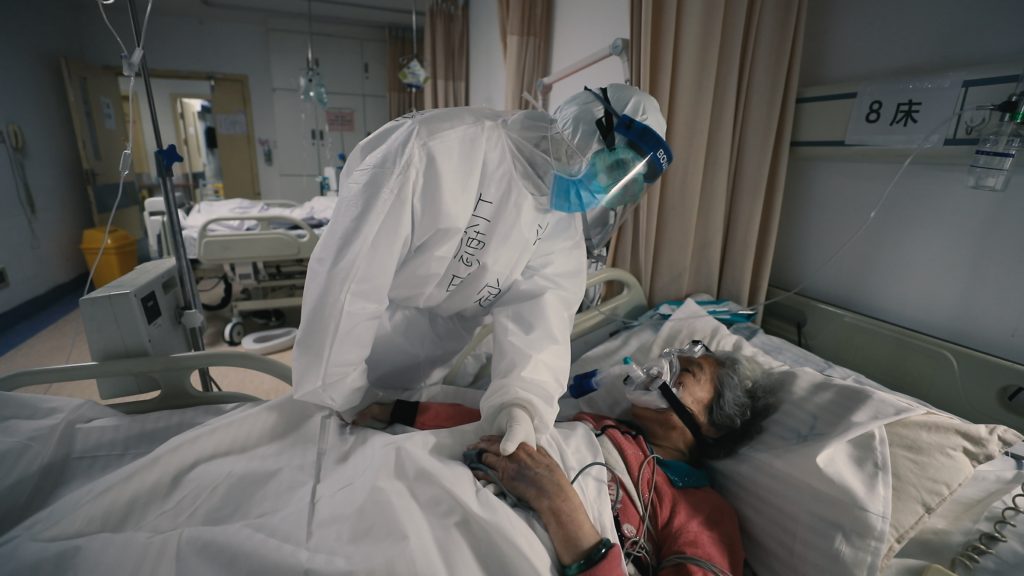
The COVID-19 pandemic has been the subject of numerous documentaries and news reports, with many focusing on what went wrong during this worldwide health crisis. The impactful documentary “76 Days” doesn’t have a political agenda, nor is it interested in placing any blame on why the virus spread to devastating proportions. Instead, the film is an unflinching look inside four of the hospitals in Wuhan, China, during the 76 days of lockdown that that city experienced when it was the COVID-19 epicenter.
Directed by Weixi Chen, Hao Wu and a Chinese news journalist who wants to remain anonymous, “76 Days” is filmed in the best format for this subject matter: completely cinéma vérité, with no archival footage, no interviews with talking heads, no voiceover narration, no re-enactments and no animation. The film is so minimalist that there isn’t even any music to trigger certain emotions.
The lockdown in Wuhan (a city of about 11 million people) began on January 23, 2020, and ended on April 8, 2020. Production of the documentary began in early February 2020. To get access inside these hospitals during the beginning of the COVID-19 crisis, the “76 Days” directors had to follow the same safety protocols as everyone else in the hospitals. (Wuhan Red Cross Hospital is one of the medical facilities in the documentary. )
According to the production notes for “76 Days,” Chen and the anonymous co-director are both news journalists who filmed the actual footage. Wu (a Chinese filmmaker who splits his time between living in the U.S. and China) stayed in the U.S. during filming, and he did the editing for the film. Although there is some footage of people outside of the hospitals, the majority of the film takes place in a hospital setting.
Wu explains in the “76 Days” production notes: “In production there were many discussions about what aspects of Wuhan’s city life to cover, and whether and how much to contrast the Wuhan stories with the increasingly global pandemic stories. Once I started editing, however, I quickly realized that the strongest footage was that shot in the hospitals. And since the worldwide media were already reporting extensively on the chronology of the pandemic’s evolution, I decided to tell our story in the barest fashion possible, to focus on the individual experiences and forego any illustration of the bigger environment that these personal stories happen in.”
He adds, “A few of the hardest-hit hospitals only allowed reporters and filming crews thoroughly vetted by the authorities. But that strict control was not applied uniformly to all hospitals or throughout the entire lockdown period. Early in the lockdown when the situation was dire and chaotic and there was a severe shortage of medical supplies, many hospitals actually welcomed media exposure to help them look for help. Some of the medical teams sent from elsewhere in China to support Wuhan were also open to being filmed, partly due to their desire to have their own images documented in this historical moment.”
All of this information is important context to explain the filmmakers’ choices in what is shown and what is not shown in the documentary. What viewers won’t see are bodies being taken out of hospitals, people dying on camera or other images that would be considered too disturbing or exploitative. That doesn’t mean that there aren’t any raw and emotional moments in the documentary, but there’s a real sense that the filmmakers wanted to respectfully show the toll that the COVID-19 crisis took on not just the patients but also the health care workers on the front lines.
The opening scene is one of those painful emotional moments in the film: A female hospital employee in a hazmat suit wails and sobs because her father has died in the hospital and she wasn’t able to say goodbye to him. She is comforted by co-workers, but they also have to deal with the reality that she can’t take time off from work because the hospital is overwhelmed and understaffed.
One of her co-workers tells her to try to pull herself together: “What will you do if you fall sick? We all have to work in the afternoon.” It’s a situation that’s experienced by untold numbers of health care workers on the front lines of the COVID-19 pandemic: Not only do they have the enormous pressure of trying to save lives, but they too could be dealing with a loss of a loved one who died of COVID-19.
Another poignant moment is when a middle-aged male patient is shown having an emotional breakdown over his COVID-19 diagnosis because he is afraid of dying. As he sobs to someone about it over the phone, whoever is on the other line doesn’t seem to be very sympathetic, because the person tells him to stop crying because the doctors must be tired of seeing him get emotional. Through the tears, the man insists that he’s still a good Communist and loyal to the Community Party.
There are only two people in the documentary who are identified by name: a nurse named Yang Li and a doctor named Tian Dingyuan. Everyone else is “anonymous,” but there are certain people who featured more prominently than others. The way the documentary is edited, viewers get to see what happens to these featured individuals at various points during the lockdown.
Yang mentions all the ID cards, phones and other personal possessions of dead patients that are stored in containers in a certain part of the hospital. The loved ones of the deceased have to be notified to claim these possessions. And toward the end of the film, Yang is the one who’s shows doing this very emotionally difficult task. In one scene, she breaks down in tears when she goes outside to meet the daughter of a dead female patient and hand over the patient’s possessions. She makes a sincere apology for not being able to save this mother, and her daughter ends up crying too.
Tian is also shown to be a compassionate hospital worker. While speaking with an elderly man who is a COVID-19 patient, the patient says of the health care workers who treat the patients: “It’s so dangerous being in contact with us. You are all fearless soldiers.” The doctor replies, “Stay strong. Your wife is waiting for you.”
One of the memorable patients who gets the most screen time is an elderly man in his 70s who keeps complaining about being confined in the hospital. He’s feisty and constantly talks about how he can’t wait to leave the hospital. At one point, he tries to leave the hospital on his own around 10 p.m., but he’s confused because he thinks it’s daytime. The hospital workers gently detain him before he leave the hospital, since he’s still under quarantine.
This patient survives, and an interesting thing happens when he’s ready to be discharged: He says he doesn’t want to leave the hospital. Why? He reveals: “My hometown is too backward.” And he says of the dwelling where he lives: “There are already too many people under one roof. And they like to pick on me.”
It’s an example of how the stories of these COVID-19 patients and hospital patients in general can be much more complex than they first appear to be. This patient who at first seems to be a cranky old man who hates being in the hospital turns out to be someone who is hurting in other ways that a hospital can’t necessarily fix. This documentary only focuses on in-patient care, but it will make people wonder about what happens to COIVD-19 patients after they leave hospitals and how they will be cared for during their outpatient recoveries.
Also featured in “76 Days” is footage of a few pregnant women who gave birth while having COVID-19. Fortunately, their babies survived, but the babies had to be quarantined from the parents. One young couple couldn’t bring their baby daughter (their firstborn child) home for a period of time that’s not stated in the movie but it’s implied to be at least two weeks. The documentary has some brief footage of the couple at home as they prepare to bring their daughter home.
When they arrive at the hospital on homecoming day, the wife comments to the husband that she hopes that their daughter is pretty. The husband says that she should be more concerned with their daughter being healthy. The wife replies confidently that she knows their daughter is healthy and it would be great if she’s also pretty. When these new parents finally get to bring their child home, there are the expected tears and emotions.
Early on in “76 Days,” the problem of not having enough room for patients is shown when a female nurse and a male co-worker have to literally barricade themselves behind a door, where people are frantically pounding to get inside. The nurse has to yell that only people with COVID-19 symptoms are allowed inside, and only a few people at a time. It’s an order that many of the people outside aren’t too happy with, but they have no choice, since many hospitals hit hard by COVID-19 had to have the same policy.
Even though some groups of people are at higher risk of dying from COVID-19, the virus doesn’t care who it infects. Yang makes this comment: “Rich, poor, revered or despised—fate befalls all.” There will continue to be debates over the politics and solutions for the COVID-19 pandemic. And even though “76 Days” takes place in China, the documentary insightfully shows how compassion and the challenging pandemic effects on patients, their loved ones and health care professionals have more similarities than differences around the world.
MTV Documentary Films released “76 Days” in select U.S. virtual cinemas on December 4, 2020. Paramount+ will premiere the movie on March 4, 2021. Paramount Home Entertainment will release the movie on digital and VOD on March 5, 2021.



